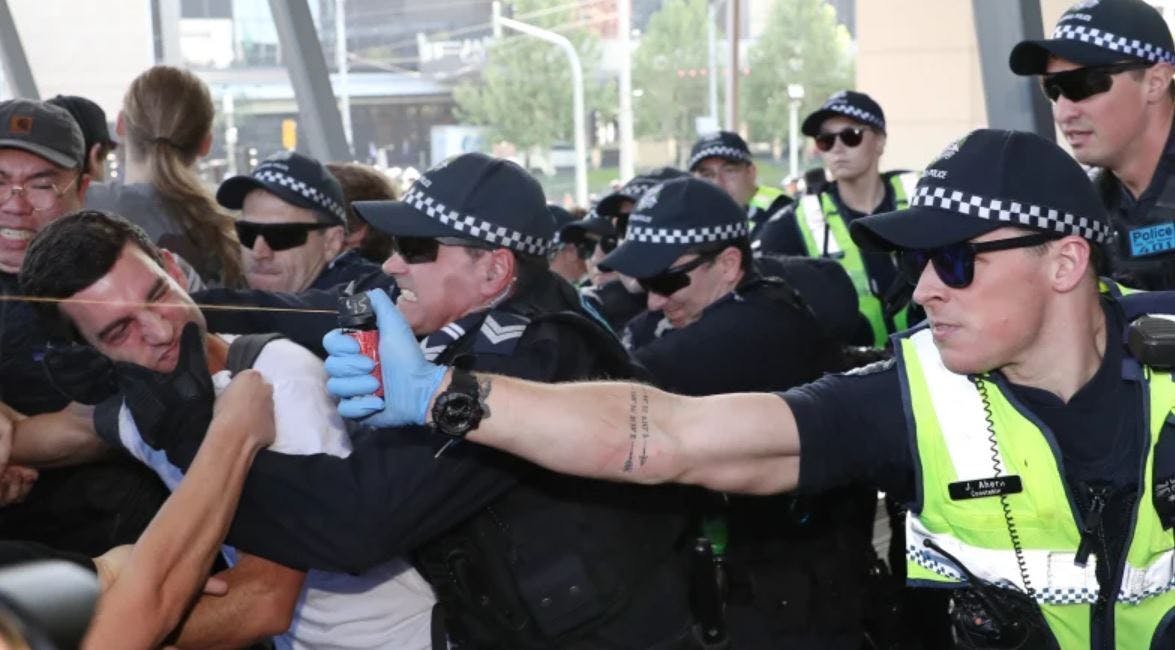Facing court for defending the planet

In early September, I was charged over the civil disobedience protest at last year’s International Mining and Resources Conference (IMARC) in Melbourne. I’m pretty sure no executives from the corporate climate criminals gathered at the conference (representing close to 20 percent of the world’s greenhouse gas emissions) have been hauled into court for their fuelling of the climate crisis. On a quick survey, they seem to be back on the street and trashing the planet for profit, as usual.
Hugh Morgan was an honoured guest at IMARC last year, having spent a lifetime heading union-busting outfits like the H.R. Nicholls Society and deriding Aboriginal land rights as “a victory for paganism, fear and superstition”. Over the past few years, Morgan has developed into corporate Australia’s highest profile climate change denier. He is co-founder and patron of the Saltbush Club, whose latest psychotic article, published on 11 September, declares that wind farms are a horrific threat to bats and birds and that, by contrast, “coal is fossil sunshine. Burning it releases new energy for industry and its combustion products bring great benefits for the green world—water vapour, carbon dioxide plant food, and valuable plant micro-nutrients”. “Incitement” to trash the planet, anyone?
Not that the corporations gathered at IMARC need any encouragement in this regard. Melbourne-based BHP is the world’s biggest mining company and one of the heavyweights at IMARC. BHP made a profit of $12.2 billion last year, with a third of that derived from coal and gas. The company won applause for donating $2 million to disaster relief following the catastrophic, climate-change-fuelled bushfires in Australia. The company made at least 500 times that amount from fossil fuel profits while the bushfires burned from August 2019 to January 2020.
None of these climate criminals live in fear of the courts. In fact, the opposite. BHP, Glencore and Anglo American are joint partners in the enormous Cerrejon open cut coal mine in Colombia. All three were represented at IMARC in 2019. In December, Colombia’s Constitutional Court ordered Cerrejon to take “urgent temporary measures to reduce the risk that the company’s operations represent for the indigenous community”, the Wayuu people, who live with poverty and malnutrition while choking on dust from the colossal mine on their land. Yet nothing changed at the mine site, the lawyers explaining that there are seventeen similar court decisions regarding Cerrejon, each one defied by the companies.
Mine workers at Cerrejon are currently on strike resisting a new, exhausting roster system they call “the shift of death”. Sintracon, the mineworkers’ union, has a history of supporting the Wayuu people in their struggles against expansion of the mine. On 1 September, members of the union showed visiting European parliamentarians the death threats they had received for challenging the company. No-one has been charged.
IMARC attendee Rio Tinto also has little to fear from the law, despite blasting ancient Indigenous cultural sites, the Juukan Gorge Caves in the Pilbara region of Western Australia, in pursuit of $125 million worth of iron ore. Cover-up has now given way to resignation, CEO Jean-Sebastien Jacques resigning in disgrace. No doubt his $11.3 million pay cheque from last year will soften the blow. Yet no-one is suggesting that he will face police raids any time soon. The Kimberley Land Council explained to the current parliamentary inquiry into the destruction of the Juukan Gorge Caves:
“Sadly, damage to and destruction of cultural heritage occurs far too frequently in the Kimberley region and opportunities to stop such destruction are limited, expensive, onerous on native title parties, and are available in the context of legislative schemes that presume mining and exploration, and other economic activities, should always be prioritised over cultural heritage.”
A company that blows up an eternity of culture will probably walk away scot-free. Companies that defy the highest courts of a country fear for nothing, while their employees suffer death threats and local indigenous people die at catastrophic rates.
It’s a different story if you stand in the way of a gathering of such companies. As far as I know, not a single cop has been charged over the violence Victoria Police unleashed on protesters linking arms outside the IMARC conference—an assault featuring pepper spray, batons, horses, “white pride” gestures and all-round thuggery. All of which, of course, is business as usual. And all of which is exactly why ordinary people need to take action ourselves in protection of life and the planet: no-one is coming to save us, except ourselves.
I’m one of about 24 protesters facing charges from the IMARC protest. We organised court support for some of the early cases, but things have slowed down—both with court appearances and solidarity activities—as the courts have clogged up during the lockdowns in Melbourne. But watch this space. There will be plenty of opportunities in the coming months to support civil disobedience protesters standing against mining company executives who trash the planet for profit, and the thugs paid to protect them.